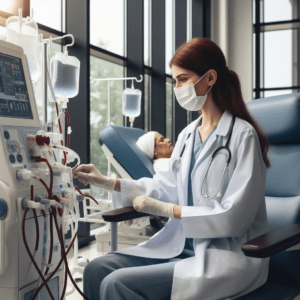The Diploma in Dialysis Assistant program is designed to train healthcare professionals to operate and manage dialysis equipment, provide care to patients undergoing renal replacement therapy, and ensure the safety and efficacy of dialysis treatments. Dialysis technicians play a critical role in the treatment of patients with kidney failure, helping to maintain their overall health and quality of life by performing hemodialysis or peritoneal dialysis procedures. This diploma program provides students with the theoretical knowledge, practical skills, and clinical experience necessary to excel in this specialized field of healthcare.
- Renal Anatomy and Physiology:
Students study the structure and function of the kidneys, including renal filtration, reabsorption, and secretion processes. A thorough understanding of renal physiology is essential for understanding the principles of dialysis and managing patients with kidney failure. - Dialysis Principles and Modalities:
This segment focuses on the principles of dialysis therapy, including hemodialysis, peritoneal dialysis, and continuous renal replacement therapy (CRRT). Students learn about dialysis equipment, vascular access devices, dialysate composition, and treatment protocols for different patient populations. - Patient Assessment and Monitoring:
Students are trained in patient assessment techniques, including vital signs monitoring, fluid balance assessment, and laboratory test interpretation. They learn to recognize signs and symptoms of complications during dialysis treatment and respond appropriately to ensure patient safety. - Dialysis Procedures:
Practical training is provided in performing hemodialysis and peritoneal dialysis procedures, including patient preparation, vascular access cannulation, dialysis machine setup, dialysate preparation, treatment initiation, and monitoring. Students learn to troubleshoot equipment malfunctions and manage emergency situations during dialysis treatments. - Infection Control and Safety Practices:
Students learn about infection control protocols, aseptic techniques, and safety practices to minimize the risk of transmission of infections in the dialysis unit. They are trained in handling and disposing of biohazardous waste, maintaining a clean and sterile environment, and adhering to regulatory guidelines. - Patient Education and Support:
Students learn to provide education and support to patients undergoing dialysis therapy, including dietary recommendations, fluid restrictions, medication management, and lifestyle modifications. They develop communication skills to address patient concerns, answer questions, and promote adherence to treatment plans. - Clinical Practicum:
Hands-on clinical experience is an integral part of the curriculum, allowing students to apply theoretical knowledge and practical skills in real-world healthcare settings. Clinical rotations typically take place in dialysis centers, hospitals, outpatient clinics, and nephrology units under the supervision of experienced dialysis professionals.
- Dialysis Technician:
Working in dialysis centers, hospitals, outpatient clinics, and nephrology units, performing dialysis procedures, monitoring patient status, and ensuring the safety and efficacy of dialysis treatments. - Clinical Coordinator:
Assuming roles as lead dialysis technicians or clinical coordinators, overseeing dialysis operations, scheduling patient treatments, managing inventory, and ensuring compliance with regulatory standards. - Patient Care Technician:
Providing direct patient care and support to individuals undergoing dialysis therapy, assisting with activities of daily living, addressing patient needs, and promoting a positive patient experience. - Biomedical Technician:
Maintaining and repairing dialysis equipment, performing preventive maintenance checks, troubleshooting technical issues, and ensuring the functionality and safety of dialysis machines and accessories.
Dialysis Nurse Assistant:
Assisting registered nurses and nurse practitioners in providing comprehensive care to patients with kidney failure, including assessment, medication administration, and patient education, within dialysis units or nephrology clinics.
The Diploma in Dialysis Technician program equips students with the knowledge, skills, and clinical experience necessary to excel in the specialized field of renal replacement therapy. By mastering the principles of dialysis therapy, patient care techniques, infection control practices, and equipment operation, graduates play a vital role in improving the health and well-being of patients with kidney failure, contributing to better outcomes and quality of life in nephrology care.
